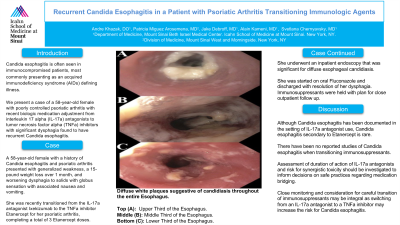Sunday Poster Session
Category: Esophagus
P0504 - Recurrent Candida Esophagitis in a Patient With Psoriatic Arthritis Transitioning Immunologic Agents
Sunday, October 22, 2023
3:30 PM - 7:00 PM PT
Location: Exhibit Hall

Has Audio

Andre Khazak, DO
Mount Sinai Beth Israel
New York, New York
Presenting Author(s)
Andre Khazak, DO1, Patricia Miguez Arosemena, MD2, Jake Debroff, MD1, Alain Kameni, MD1, Svetlana Chernyavsky, MD1
1Mount Sinai Beth Israel, New York, NY; 2Mount Sinai West and Morningside, New York, NY
Introduction: Candida esophagitis is often seen in immunocompromised patients, most commonly presenting as an acquired immunodeficiency syndrome (AIDs) defining illness in patients with poorly controlled human immunodeficiency virus (HIV). It can also be seen in patients with hematologic or solid organ malignancies on cytotoxic treatment regimens and patients on chronic steroids. There have been no documented cases of Candida in patients undergoing biologic medication adjustment from interleukin 17 alpha (IL-17a) antagonists to tumor necrosis factor alpha (TNFa) inhibitors, requiring further investigation into practice guidelines and associated risks of bridging medications. We present a case of a 58-year-old female with poorly controlled psoriatic arthritis with recent biologic medication adjustment and significant dysphagia found to have recurrent Candida esophagitis.
Case Description/Methods: A 58-year-old female with a history of Candida esophagitis, gastric bypass with small bowel obstruction, multiple endocrine neoplasia 2b, and psoriatic arthritis presented with generalized weakness and a 15-pound weight loss over 1 month. She reported worsening dysphagia to solids with globus sensation and associated nausea and vomiting. She was initially planned for outpatient upper gastrointestinal series however presented to the hospital before completing the work up due to severe weakness. She was also recently transitioned from the IL-17a antagonist Ixekizumab to the TNFa inhibitor Etanercept for her poorly controlled psoriatic arthritis prior to admission, completing a total of 3 Etanercept doses. Given her weight loss and dysphagia, she underwent an inpatient endoscopy that was significant for diffuse esophageal candidiasis. She was started on oral Fluconazole and discharged with resolution of her dysphagia. Immunosuppressants were held with plan for close outpatient follow up.
Discussion: Although Candida esophagitis has been documented in the setting of IL-17a antagonist use, Candida esophagitis secondary to Etanercept is rare. There have been no reported studies of Candida esophagitis when transitioning immunosuppressants. Assessment of duration of action of IL-17a antagonists and risk for synergistic toxicity should be investigated to inform decisions on safe practices regarding medication bridging. Close monitoring and consideration for careful transition of immunosuppressants may be integral as switching from an IL17 antagonist to a TNF alpha inhibitor may increase the risk for Candida esophagitis.

Disclosures:
Andre Khazak, DO1, Patricia Miguez Arosemena, MD2, Jake Debroff, MD1, Alain Kameni, MD1, Svetlana Chernyavsky, MD1. P0504 - Recurrent Candida Esophagitis in a Patient With Psoriatic Arthritis Transitioning Immunologic Agents, ACG 2023 Annual Scientific Meeting Abstracts. Vancouver, BC, Canada: American College of Gastroenterology.
1Mount Sinai Beth Israel, New York, NY; 2Mount Sinai West and Morningside, New York, NY
Introduction: Candida esophagitis is often seen in immunocompromised patients, most commonly presenting as an acquired immunodeficiency syndrome (AIDs) defining illness in patients with poorly controlled human immunodeficiency virus (HIV). It can also be seen in patients with hematologic or solid organ malignancies on cytotoxic treatment regimens and patients on chronic steroids. There have been no documented cases of Candida in patients undergoing biologic medication adjustment from interleukin 17 alpha (IL-17a) antagonists to tumor necrosis factor alpha (TNFa) inhibitors, requiring further investigation into practice guidelines and associated risks of bridging medications. We present a case of a 58-year-old female with poorly controlled psoriatic arthritis with recent biologic medication adjustment and significant dysphagia found to have recurrent Candida esophagitis.
Case Description/Methods: A 58-year-old female with a history of Candida esophagitis, gastric bypass with small bowel obstruction, multiple endocrine neoplasia 2b, and psoriatic arthritis presented with generalized weakness and a 15-pound weight loss over 1 month. She reported worsening dysphagia to solids with globus sensation and associated nausea and vomiting. She was initially planned for outpatient upper gastrointestinal series however presented to the hospital before completing the work up due to severe weakness. She was also recently transitioned from the IL-17a antagonist Ixekizumab to the TNFa inhibitor Etanercept for her poorly controlled psoriatic arthritis prior to admission, completing a total of 3 Etanercept doses. Given her weight loss and dysphagia, she underwent an inpatient endoscopy that was significant for diffuse esophageal candidiasis. She was started on oral Fluconazole and discharged with resolution of her dysphagia. Immunosuppressants were held with plan for close outpatient follow up.
Discussion: Although Candida esophagitis has been documented in the setting of IL-17a antagonist use, Candida esophagitis secondary to Etanercept is rare. There have been no reported studies of Candida esophagitis when transitioning immunosuppressants. Assessment of duration of action of IL-17a antagonists and risk for synergistic toxicity should be investigated to inform decisions on safe practices regarding medication bridging. Close monitoring and consideration for careful transition of immunosuppressants may be integral as switching from an IL17 antagonist to a TNF alpha inhibitor may increase the risk for Candida esophagitis.

Figure: Top (A): Diffuse white plaques suggestive of candidiasis throughout the entire Esophagus. Upper Third of the Esophagus.
Middle (B): Middle Third of the Esophagus.
Bottom (C): Lower Third of the Esophagus.
Middle (B): Middle Third of the Esophagus.
Bottom (C): Lower Third of the Esophagus.
Disclosures:
Andre Khazak indicated no relevant financial relationships.
Patricia Miguez Arosemena indicated no relevant financial relationships.
Jake Debroff indicated no relevant financial relationships.
Alain Kameni indicated no relevant financial relationships.
Svetlana Chernyavsky indicated no relevant financial relationships.
Andre Khazak, DO1, Patricia Miguez Arosemena, MD2, Jake Debroff, MD1, Alain Kameni, MD1, Svetlana Chernyavsky, MD1. P0504 - Recurrent Candida Esophagitis in a Patient With Psoriatic Arthritis Transitioning Immunologic Agents, ACG 2023 Annual Scientific Meeting Abstracts. Vancouver, BC, Canada: American College of Gastroenterology.
